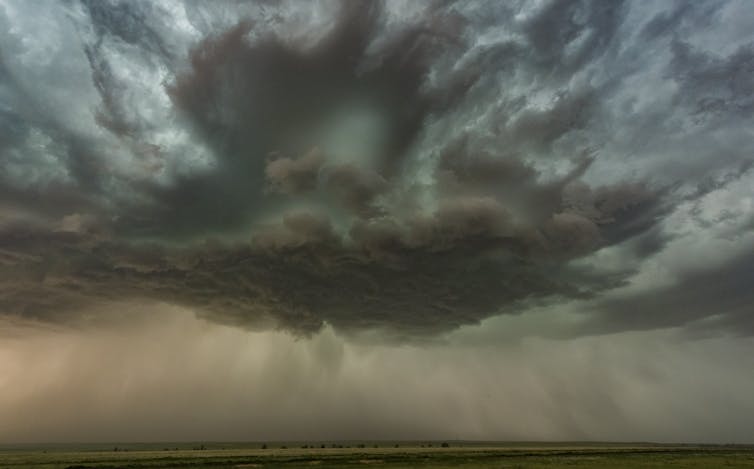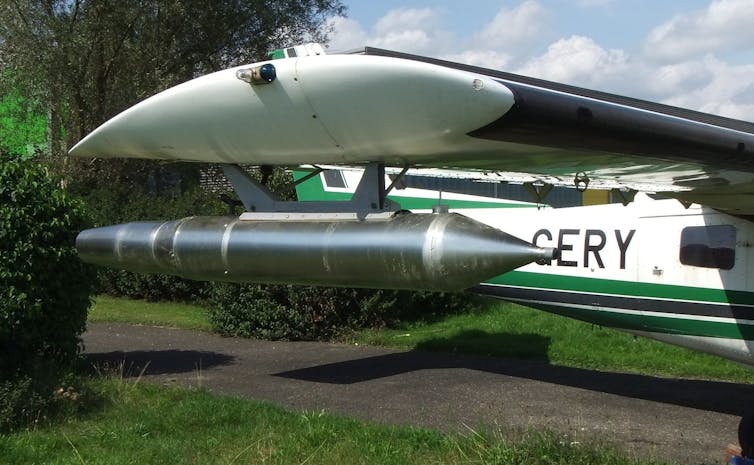Podcasts
Cloud seeding can increase rain and snow, and new techniques may make it a lot more effective – podcast
Cloud seeding can increase rain and snow, and new techniques may make it a lot more effective – podcast

John Finney Photography/Moment via Getty Images
Daniel Merino, The Conversation and Nehal El-Hadi, The Conversation
When an unexpected rainstorm leaves you soaking wet, it is an annoyance. When a drought leads to fires, crop failures and water shortages, the significance of weather becomes vitally important.
If you could control the weather, would you?
Small amounts of rain can mean the difference between struggle and success. For nearly 80 years, an approach called cloud seeding has, in theory, given people the ability to get more rain and snow from storms and make hailstorms less severe. But only recently have scientists been able to peer into clouds and begin to understand how effective cloud seeding really is.
In this episode of “The Conversation Weekly,” we speak with three researchers about the simple yet murky science of cloud seeding, the economic effects it can have on agriculture, and research that may allow governments to use cloud seeding in more places.
Katja Friedrich, a professor of atmospheric and oceanic sciences at the University of Colorado, Boulder in the U.S., is a leading researcher on cloud seeding. “When we do cloud seeding, we are looking for clouds that have tiny super-cooled liquid droplets,” she explains. Silver iodide is very similar in structure to an ice crystal. When the droplets touch a particle of silver iodide, “they freeze, then they can start merging with other ice crystals, become snowflakes and fall out of the cloud.”
While the process is fairly straightforward, measuring how effective it is in the real world is not, according to Friedrich. “The problem is that once we modify a cloud, it’s really difficult to say what would’ve happened if you hadn’t cloud-seeded.” It’s hard enough to predict weather without messing with it artificially.

Zuckerle/Wikimedia Commons, CC BY-SA
In 2017, Friedrich’s research group had a breakthrough in measuring the effect of cloud seeding. “We flew some aircraft, released silver iodide and generated these clouds that were like these six exact lines that were downstream of where the aircraft were seeding,” she says. They then had a second aircraft fly through the clouds. “We could actually quantify how much snow we could produce by two hours of cloud seeding.” That effect, according to research on cloud seeding, is an increase in precipitation of somewhere around 5% to 20% or 30%, depending on conditions.
Measuring the effect on precipitation – whether rain or snow – directly may have taken complex science and a bit of luck, but in places that have been using cloud seeding for long periods of time, the economic benefits are shockingly clear.
Dean Bangsund is a researcher at North Dakota State University who studies the economics of agriculture. “We have a high amount of hail damage in North Dakota,” said Bangsund. For decades, the state government has been using cloud seeding to reduce hail damage, as cloud seeding leads to the formation of more pieces of smaller hail compared to fewer pieces of larger hail. “It doesn’t 100% eliminate hail; it’s designed to soften the impact.”
Every 10 years, the state of North Dakota does an analysis on the economic impacts of the cloud seeding program, measuring both reduction in hail damage and benefits from increased rain. Bangsund led the last report and says that for every dollar spent on the cloud seeding program, “we are looking at something that is anywhere from $8 or $9 in benefit on the really lowest scale, up to probably $20 of impact per acre.” With millions of acres of agricultural fields in the cloud seeding area, that is a massive economic benefit.
Both Freidrich and Bangsund emphasized that cloud seeding, while effective in some cases, cannot be used everywhere. There is also a lot of uncertainty in how much of an effect it has. One way to improve the effectiveness and applicability of cloud seeding is by improving the seed. Linda Zou is a professor of civil infrastructure and environmental engineering at Khalifa University in the United Arab Emirates.
Her work has focused on developing a replacement for silver iodide, and her lab has developed what she calls a nanopowder. “I start with table salt, which is sodium chloride,” says Zou. “This desirable-sized crystal is then coated with a thin nanomaterial layer of titanium dioxide.” When salt gets wet, it melts and forms a droplet that can efficiently merge with other droplets and fall from a cloud. Titanium dioxide attracts water. Put the two together and you get a very effective cloud-seeding material.
From indoor experiments, Zou found that “with the nanopowders, there are 2.9 times the formation of larger-size water droplets.” These nanopowders can also form ice crystals at warmer temperatures and less humidity than silver iodide.
As Zou says, “if the material you are releasing is more reactive and can work in a much wider range of conditions, that means no matter when you decide to use it, the chance of success will be greater.”
This episode was written and produced by Katie Flood. Mend Mariwany is the executive producer of The Conversation Weekly. Eloise Stevens does our sound design, and our theme music is by Neeta Sarl.
You can find us on Twitter @TC_Audio, on Instagram at theconversationdotcom or via email. You can also subscribe to The Conversation’s free daily email here.
Listen to “The Conversation Weekly” via any of the apps listed above, download it directly via our RSS feed or find out how else to listen here.
Daniel Merino, Associate Science Editor & Co-Host of The Conversation Weekly Podcast, The Conversation and Nehal El-Hadi, Science + Technology Editor & Co-Host of The Conversation Weekly Podcast, The Conversation
This article is republished from The Conversation under a Creative Commons license. Read the original article.
Mississippi Today
Political stumping mild at Neshoba County Fair
Mississippi Today’s politics team recaps the 2025 Neshoba County Fair. This year’s political speaking lacked some of the fire and brimstone of big election years, but state leaders laid out some major policy plans sure to dominate debate in the next legislative session.
This article first appeared on Mississippi Today and is republished here under a Creative Commons Attribution-NoDerivatives 4.0 International License.
The post Political stumping mild at Neshoba County Fair appeared first on mississippitoday.org
Crooked Letter Sports Podcast
Rusty Hampton and the glory years of sports writing
Rusty Hampton was the sports editor at the Clarion Ledger for 11 years and worked there for 25 years in two different stints. He talks about some of the highlights, including Mississippi State’s amazing run to the 1996 Final Four.
Also discussed: a salute to Ryne Sandberg, the SEC preseason football poll, and Konnor Griffin, the newly elevated top prospect in professional baseball.
Stream all episodes here.
This article first appeared on Mississippi Today and is republished here under a Creative Commons Attribution-NoDerivatives 4.0 International License.
The post Rusty Hampton and the glory years of sports writing appeared first on mississippitoday.org
Mississippi Today
Why Andy Gipson is running for governor
Republican Andy Gipson, the first candidate to publicly announce a run for Mississippi governor in 2027, outlines his five-plank platform. No. 1 is fighting crime, which Gipson says is rising in what were once quiet rural areas, because “If people don’t feel safe, nothing else matters.” He also offers a brief sampling of his baritone crooning from his just-released two studio albums.
This article first appeared on Mississippi Today and is republished here under a Creative Commons Attribution-NoDerivatives 4.0 International License.
The post Why Andy Gipson is running for governor appeared first on mississippitoday.org
-
News from the South - North Carolina News Feed6 days ago
What we know about Charlie Kirk shooting suspect, how he was caught
-
News from the South - North Carolina News Feed7 days ago
Federal hate crime charge sought in Charlotte stabbing | North Carolina
-
Our Mississippi Home5 days ago
Screech Owls – Small but Cute
-
News from the South - Arkansas News Feed6 days ago
NW Arkansas Championship expected to bring money to Rogers
-
News from the South - North Carolina News Feed7 days ago
Under pressure, some immigrants are leaving American dreams behind
-
Mississippi News Video7 days ago
Mississippi Science Fest showcases STEAM events, activities
-
News from the South - Florida News Feed7 days ago
CBS Miami highlights free mammogram program with mobile mammovan
-
News from the South - Tennessee News Feed6 days ago
What to know about Trump’s National Guard deployment to Memphis












































